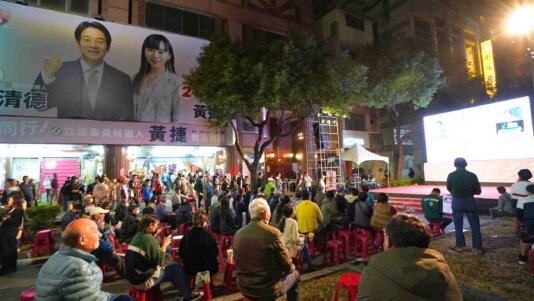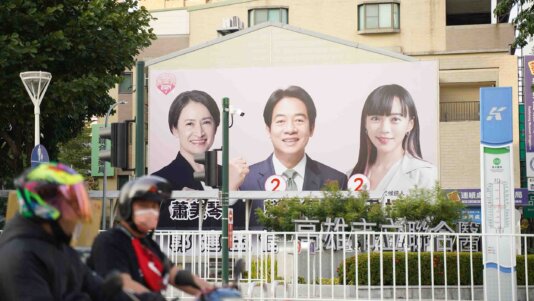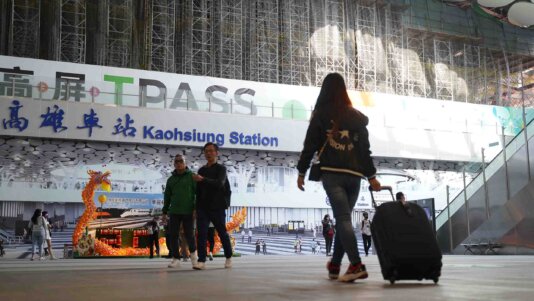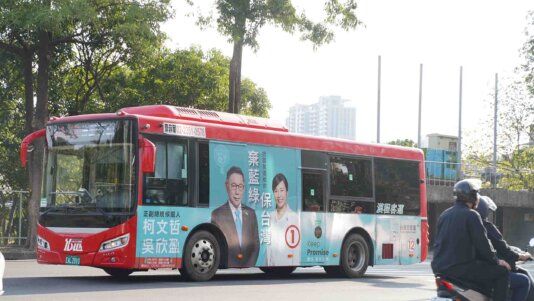- About
- Topics
- Picks
- Audio
- Story
- In-Depth
- Opinion
- News
- Donate
-
Signup for our newsletterOur Editors' Best Picks.Send
Read, Debate: Engage.
| January 15, 2024 | |
|---|---|
| topic: | Election |
| tags: | #Taiwan, #China, #elections, #democracy |
| located: | Taiwan |
| by: | Vanesse Chan |
Taiwan’s ruling Democratic Progressive Party (DPP) candidate William Lai Ching-te, denounced as a separatist by Beijing, won big in the presidential election on Saturday as millions of voters turned out at the polling stations across the self-ruled island.
The DPP made an unprecedented victory in the presidential election, securing a third term in office, but the party lost the majority in parliament.
China had been watching the island’s election closely and officials previously referred to it as "a choice between war and peace." The Taiwan Affairs Office, an organisation in mainland China, said the result does not represent the mainstream opinion and the office "resolutely opposes Taiwan independence."
Lai Ching-te, who has become the successor of Tsai Ing-wen, called the result a "victory for the community of democracies." He and his new vice-president Hsiao Bi-khim, vowed to defend Taiwan from China’s "intimidation."
China’s Taiwan Affairs Office earlier commented that Lai was a “stubborn and pragmatic worker of Taiwan independence,” adding that it will create a "dangerous" situation in the straits if he is elected.
China and the US responded soon after the vote.
China’s reaction will likely be stronger than rhetoric. "The DPP’s victory would likely be met with Beijing’s rhetorical critique, targeted economic sanctions against select Taiwanese exports, and show of force," Wen-ti Sung, a political scientist from the Australian National University’s Taiwan Studies Programme, told FairPlanet.
He added that Beijing’s attempted economic threats might "drive more Taiwanese voters to back the more Taiwanese nationalist candidates - the very opposite of Beijing’s political objective."
"US-China relations will not be changed in the short run with the electoral results and a war is unlikely to break out in the immediate future," said Wei-Ting Yen, an assistant professor at Franklin and Marshall College in Pennsylvania.
"China has a lot to worry about domestically," she explained, adding that starting a military attack on Taiwan is not China’s president Xi’s priority.
The victory, she said, can reflect that Taiwanese people support Tsai’s approach to continue engaging with the world and build strong relationships with the US
China’s spokesperson for China’s Ministry of Foreign Affairs told reporters after the election that "Taiwan is a part of China," and President Biden said the US does not support the independence of Taiwan.
Hundreds of travelers carrying luggage arrived at the Kaohsiung Station in southern Taiwan Saturday morning, as many of them returned to their hometown to cast the pivotal vote. Near the train station, 26-year-old Joy Li said she traveled from Tai Chung in the early morning to her hometown, Koahshiung, to vote for the "national leader."
While Lai won the majority of votes in the island’s south of Tainan, a region historically dominated by the DPP, a swing of support emerged ahead of the votes as some were dissatisfied with the ruling party’s performance.
In the street of Kaohsiung, a hawker making traditional sweet biscuits told FairPlanet he was "angry" with the DPP’s government, even though eight years ago he voted for current president Tsai Ing-wen with hopes that she would bring a better future to the Taiwanese people.
Now, the 43-year-old said he voted for Ko Wen-je, the leader of the center-left Taiwan People’s Party (TPP) and a former Taipei mayor who was a surgeon before joining politics. He added that Ko is a "pragmatic" worker who could hopefully solve domestic problems such as housing prices, if he were elected.
The emergence of Ko has shaken politics. He has a passionate base of support, and they are mostly young people. A supporter of Lai, 30-year-old Jenny, told FairPlanet that many of her friends shifted their support to Ko, the man who came up to bring waves to the political landscape that has long been dominated by the two major parties.
"Misinformation has infiltrated Taiwan. For example, people think Tsai’s government had done poorly to handle COVID-19, but in fact, we were doing fairly well compared with lots of places in the world," she said.
"Taiwanese people will not let China enter our territory," said Jenny at an election rally on Saturday evening supporting the DPP. Praising the current president Tsai Ing-wen, she has high expectations that Lai will be about to keep the same diplomatic policies and stand firm against China.
Crowds cheered at the DPP’s election rally as Lai received 40 per cent of the votes, with more than 5.5 million ballots.
"The whole world can see Taiwan’s freedom and democracy," said Chuang, a supporter of the DPP. The 70-year-old went on to say that he feared Taiwan would become the "next Hong Kong" - where China’s sweeping political crackdown is underway - if Kuomintang (KMT) is elected.
His opponent Hou Yu-ih of the largest opposition, KMT, came in second with nearly 4.7 million votes, followed by Ko Wen-je of the Taiwan People’s Party, who received only about a quarter of the total votes (26 per cent).
58-year-old Chao, who voted for KMT’s Hou for peace and prosperity, said he was "slightly disappointed," but is not worried that war will break out anytime soon.
Military tensions in the Straits had hyped up weeks before the elections. Beijing in early January sent four balloons over the island, three of them floating near a key air force base. Days before the election, China fired an 'astronomical' satellite over the sky of Taiwan, triggering an island-wide alert.
These signals, according to Taiwanese political scientist Yen, can be interpreted as China’s “strong intention to persuade voters to vote for non DPP [candidate]."
The disputes over the sovereignty of Taiwan have been a problem for generations. In 1992, China and Taiwan had a verbal agreement on the 'One China' policy, which allowed them to engage in dialogues without touching on the sensitive sovereignty issue.
Later on, both sides have adopted different interpretations of 'sovereignty.' While Beijing considers Taiwan as its own territory, Taiwan sees itself as the legitimate governing body of this entity and rejected the sovereignty claims.
Two major parties in Taiwan - the ruling Democratic Progressive Party (DDP) and the conservative Kuomintang (KMT) party - have both stated Taiwan is a sovereign country. The DDP, however, interprets Taiwan as an independent country, while KMT views the island as a part of China and does not support independence.
Image taken from Lai Ching-te´s Facebook.





By copying the embed code below, you agree to adhere to our republishing guidelines.